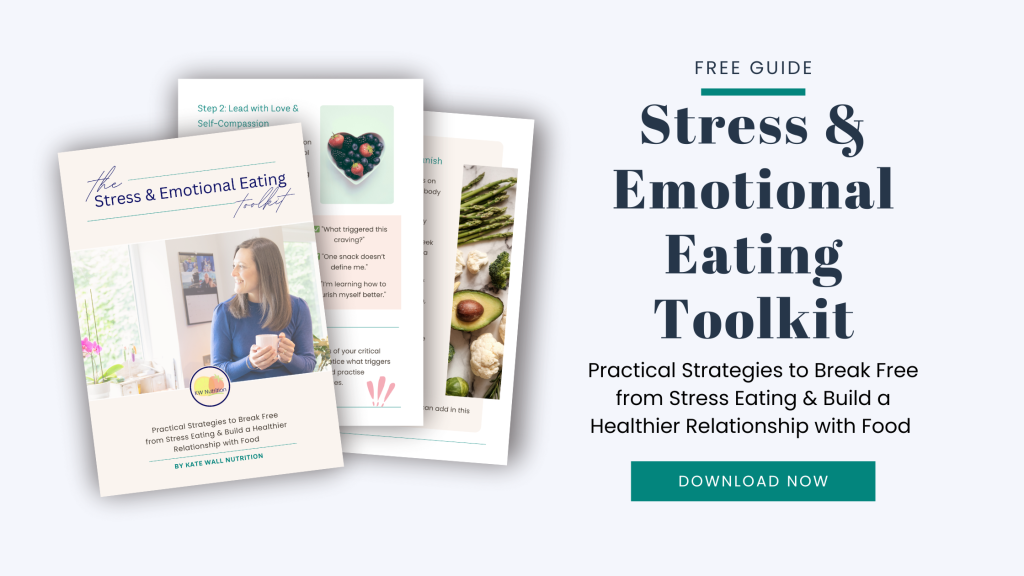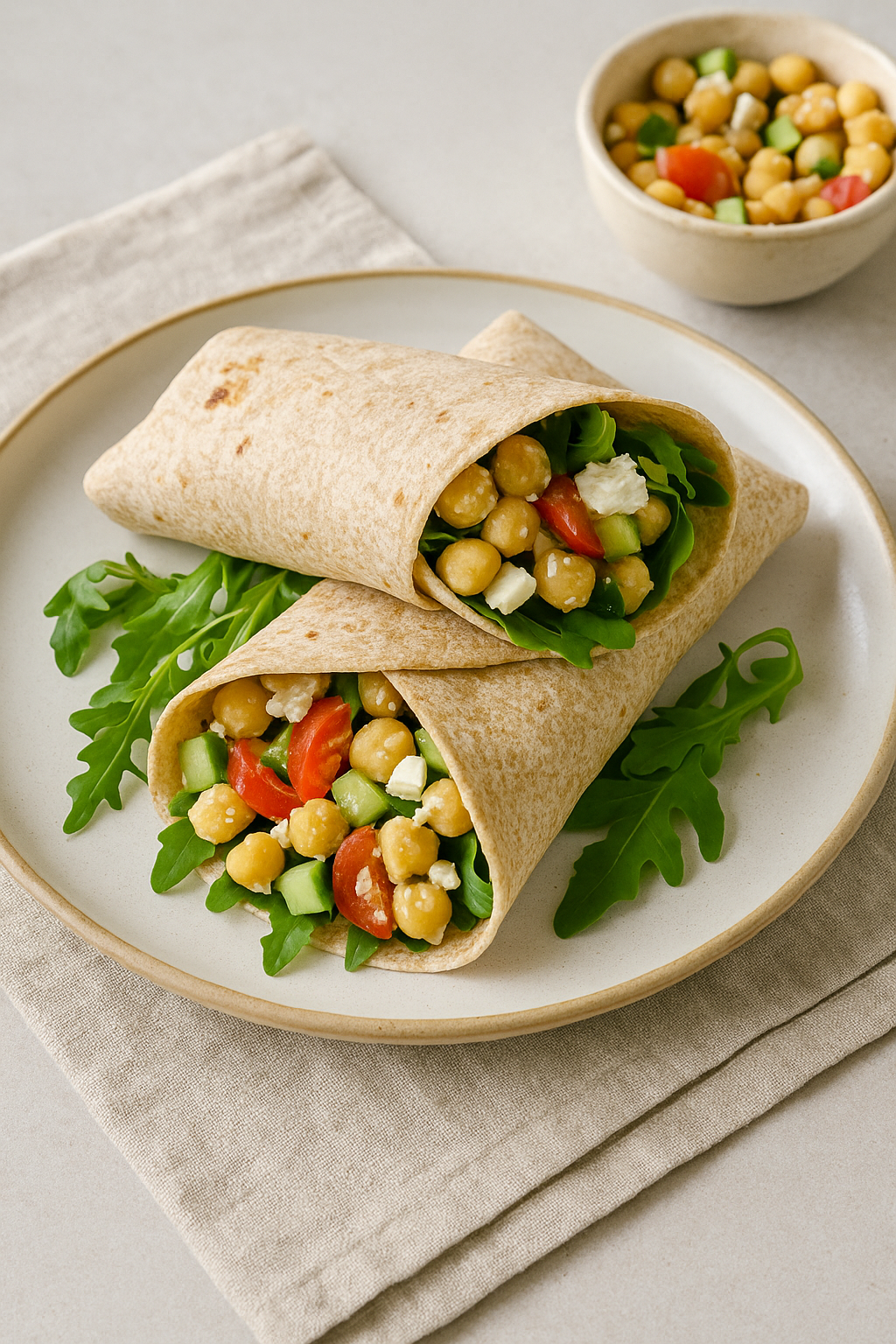Feeling stressed and reaching for food to cope? You’re not alone.
April is Stress Awareness Month, and this year’s theme, #LeadWithLove, encourages us to approach ourselves and others with kindness, compassion, and acceptance—especially when faced with challenges.
For many people, stress and eating are deeply connected. Whether it’s grabbing chocolate after a tough meeting, snacking in front of the TV after a long day, or feeling overwhelmed by guilt for ‘failing’ a diet, food often becomes tangled up in stress.
But here’s the thing—it’s not just about willpower. The way we eat when we’re stressed is often a result of many factors including hormones, emotions, and years of diet culture messaging. Instead of punishing ourselves, what if we led with love instead?
Why Stress Makes You Crave Certain Foods
Typically stress eating has nothing to do with physical hunger and everything to do with soothing or suppressing uncomfortable feelings and situations.
When we’re under stress, our body releases cortisol, the hormone that helps us respond to perceived threats. But chronic stress—whether from work pressures, body image concerns, or feeling out of control around food—keeps cortisol levels high, leading to:
- Increased cravings for high-energy foods like sugar and carbs
- Poor digestion due to the body staying in ‘fight or flight’ mode
- More emotional eating, as food provides temporary comfort or distraction
The Science Behind Stress & Eating
High-sugar treats such as chocolate, biscuits, sweets and cakes provide a welcome distraction from our worries. When we’re stress-eating it can feel harder to control the amount of food that we’re eating. In a stressed state you’re likely to eat more food and faster. You are eating as a reactive response to an emotion or perceived threat rather than a calm and mindful way-you’ll find yourself eating a biscuit, and then another one, and so on.
When we eat high-fat and high-sugar foods, such as chocolate, it provides what’s known as a ‘hedonic’ effect,”. This means that we feel good from eating those foods and as a result while we’re eating them we’re not secreting as much of the stress hormone cortisol, so we feel calmer.
The brain is saying ‘that feels good, I didn’t feel stressed while eating that’. The chances are that once you’ve stopped eating, you’ll feel stressed again and crave more to get that same feeling. The brain is telling you ‘That’s what made me feel calm before, let’s try that again’.” This can turn into a vicious cycle because you are not addressing the cause of the problem.
Stress can have a negative impact on sleep. When sleep is poor, the hunger hormone ghrelin (hunger hormone) increases, so you’re more likely to feel hungry. At the same time, leptin, the hormone that tells you when you’re full, decreases, so you need more food to get to the same level of fullness that you’d feel after a normal night’s sleep and can crave energy rich foods as you feel low in energy.
So many people are not managing stress throughout the day and then turning to food when they get home either as a reward, a distraction or for some comfort after a difficult day.
Sound familiar? Many of my clients—whether they’re dealing with PCOS, menopause, high cholesterol, or emotional eating—feel stuck in a cycle of stress, food guilt, and frustration.

How Stress Manifests in Different Eating Patterns
If you struggle with emotional eating: You might eat in response to stress, then feel guilty and try to ‘make up for it’ by restricting—only to repeat the cycle.
If you’re navigating menopause: Hormonal changes and increased stress may make weight feel harder to manage, leading to frustration and self-criticism.
If you have PCOS: Blood sugar fluctuations can be worsened by stress, making cravings feel even more intense.
If you’re a busy professional with high cholesterol: Juggling work and home life can mean grabbing quick, processed foods, increasing stress about your health.
No matter your situation, the key isn’t just about ‘fixing’ your diet—it’s about reducing stress in a way that supports both your body and mind.
Why Restriction Makes Stress Eating Worse
Many people believe that strict rules around food will help them “stay in control” when feeling stressed. But here’s what actually happens:
Restriction increases cravings – The more we tell ourselves we “can’t have” certain foods, the more we want them.
It reinforces guilt and failure – If you break a ‘rule,’ it feels like you’ve ‘failed,’ which increases stress and leads to more emotional eating.
It disconnects us from our body’s needs – Instead of tuning into hunger and fullness cues, we rely on external rules that don’t support us.
Breaking free from stress-related eating isn’t about controlling food—it’s about managing stress and building self-compassion.
5 Ways to Reduce Stress Without Turning to Food
You can’t just tell yourself ‘not to stress eat’. You need to understand the triggers and then find activities that help you manage and lower your stress. This can take time to put into practice and may require professional support.
1. Lead with Love & Self-Compassion
The way you talk to yourself matters. If you find yourself saying, “I have no willpower” or “I’ve ruined everything”, try to pause and ask: Would I speak to a friend like this?
Reframing your mindset from self-criticism to self-kindness reduces stress and helps you build a healthier relationship with food.
Practical Tip: Try This Self-Compassion Exercise
✔ Write down three things you’re grateful to your body for today.
✔ When negative thoughts come up, challenge them with a kinder response (e.g., replace “I’ve failed” with “I’m learning and improving”).
2. Nourish, Don’t Punish
Instead of focusing on what to cut out, think about what you can add to your diet to support your body during stressful times:
✔ Protein-rich meals to balance blood sugar
✔ Fibre-packed foods to support gut health and digestion
✔ Magnesium-rich foods (like leafy greens and nuts) to help regulate stress hormones
3. Mindful Eating: Slow Down & Tune In
Ever found yourself eating quickly at your desk or finishing a bag of crisps without realising? Rushed, distracted eating increases stress and disconnects you from your body’s hunger and fullness cues.
Simple Ways to Eat More Mindfully:
🧘 Take 3 deep breaths before eating to shift out of stress mode
🍽 Eat without distractions at least once a day
🚶 Take a short walk after meals to aid digestion and lower cortisol4. Identify Stress Triggers & Find Alternatives
Instead of trying to ‘control’ stress eating, explore what’s driving it. Ask yourself:
❓ What am I feeling right now? (Stressed, anxious, bored, lonely?)
❓ What do I actually need? (Rest, movement, connection, nourishment?)
Then, find a non-food alternative to support yourself—whether that’s a 5-minute break, journaling, or stepping outside for fresh air.
5. Build a Routine That Supports YOU
Your nutrition, sleep, movement, and self-care don’t have to be perfect—they just need to be consistent and realistic for your life.
✔ Prioritise protein-rich breakfasts to stabilise blood sugar and reduce cravings
✔ Create wind-down routines to improve sleep and stress levels
✔ Move in a way that feels good, not as punishment for eating
Final Thoughts: Stress, Food & Self-Kindness
Food is not the enemy. Your body is not the enemy.
The more we approach food and health with self-compassion rather than stress and punishment, the easier it becomes to make changes that truly last.
💛 This Stress Awareness Month, I invite you to #LeadWithLove—towards yourself, your body, and your well-being.
If stress eating or food guilt is something you struggle with, I’ve created a free “Stress & Emotional Eating Toolkit” packed with practical tips, self-compassion exercises, and nourishing meal ideas.
And if you’re ready to take the next step towards a healthier relationship with food and your body, I’d love to help.
📅 Book a free discovery call to find out how we can work together.




